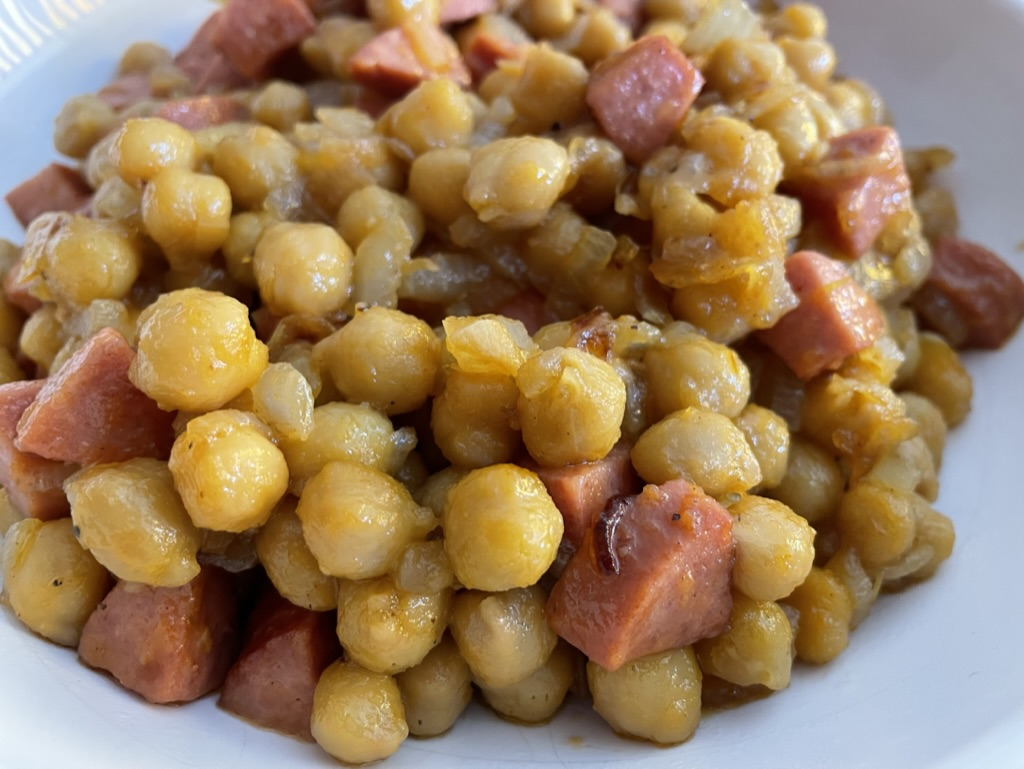This is an extremely simple and absolutely comfy pasta dish. There are two key elements to making a perfect carbonara: using the correct ingredients (guanciale, pecorino, egg) and not overcooking the egg.
There are actually only 4 steps (cook pasta, cook guanciale, mix egg with cheese, create carbonara), but I will be thorough because there are many places where this recipe can be wrong and you will end up with a bland sauce, gummy noodles, or worse, scrambled eggs with pasta.
I used too much egg/cheese in my pic (or too little pasta), but getting the right proportions when cooking for one is hard. It was great, anyway.
1. Cook the guanciale
Cut the guanciale in 2mm-wide strips. Guanciale is pork cheeks, and it has a stronger taste than bacon or pancetta, which is the pork belly. You can replace guanciale with bacon, but you and your descendants will be cursed by the whole population of Italy. I’m not italian, so I will allow it. However, if you can’t find guanciale, at least aim for pancetta. It will be blander, lacking the stingy taste of the guanciale. Make sure to try guanciale at least once and you’ll never go back to bacon carbonaras.
Stir-fry the guanciale in a bit of olive oil or pork lard. This is a fatty cut, and will release fat when cooking, so it doesn’t need a whole lot of oil, just a bit to kickstart the cooking. Stop the heat when the guanciale is transparent and a bit crispy, but not too burnt. Leave it in the pan, make sure it doesn’t get too cold.
2. Cook the pasta
The original recipe uses spaghetti, but I had thin tagliatelle at home. Cook the tagliatelle in salty water. Add a tablespoon of salt for every liter of water. Unlike rice, the pasta does not absorb a lot of the saltiness, so it won’t be too salty unless you go totally overboard. I go with 100g of pasta if the dish is a full meal, and 70g if the meal has an entree
The cooking time is usually written in the packet, but in any case, taste it. You should stop the heat when the pasta is al dente, that is, a little undercooked.
3. Beat an egg with pecorino
While the pasta cooks, beat an egg with shredded pecorino cheese. The original recipe calls for 1 egg plus an egg yolk per 2 people, but when I’m cooking for myself I just use a single egg with no extras. A good amount of cheese is between 30g and 40g per person. Don’t use too much. Don’t substitute with parmesan, it’s too flavorful and will overpower the guanciale. If you don’t have pecorino, look for a mid-curated cheese.
4. Mix the carbonara
Once the pasta is done, transfer it to the pan with the guanciale. Transfer around 150ml (per person) of the pasta water to the pan, too. Stir so the pasta and guanciale are well mixed and there is a layer of water-oil over all the tagliatelle. Do this step BEFORE adding in the egg.
Now for the critical part: controlling the heat of the pan before adding the egg. There should be a good amount of residual heat. If the pan is too cold, turn the heat on for a few seconds, but turn it off later! There should be enough heat so it’s hot to the touch, but the oil should not be sizzling.
Add the egg-cheese mixture to the pan and STIR STIR STIR. Mix heavily so the egg covers the pasta, and the hot pasta-water-guanciale mix transfers its heat to the egg. The egg should coagulate, but not fully cook. Keep stirring to avoid curdling the egg. The ideal degree of cooking means that the egg is not runny, but it doesn’t taste like an omelet.
After about 20-30 seconds, the egg should be cooked. If in doubt, undercook, because the hot meal will continue cooking the egg while in your plate. If it tastes like scrambled eggs, sorry, you failed. Enjoy your non-carbonara but tasty pasta, and adjust your process next time. I failed twice until I learned the trick. Now my carbonara is perfect. Don’t despair and keep trying.
Serve. Grind a bit of black pepper on top of the plate for decoration. If you’re a fan of parmesan, you can shred a bit too. Just for decoration! You want to taste the egg.
Enjoy!

